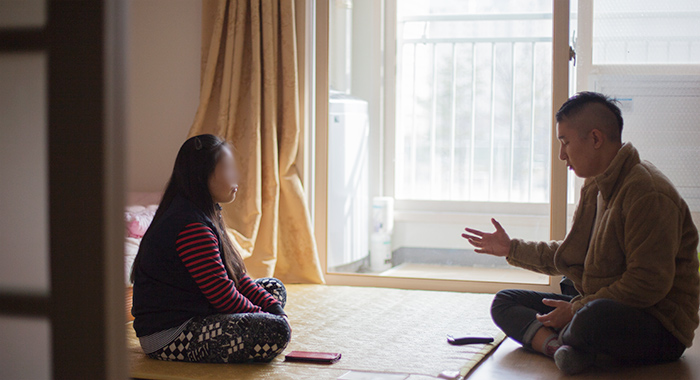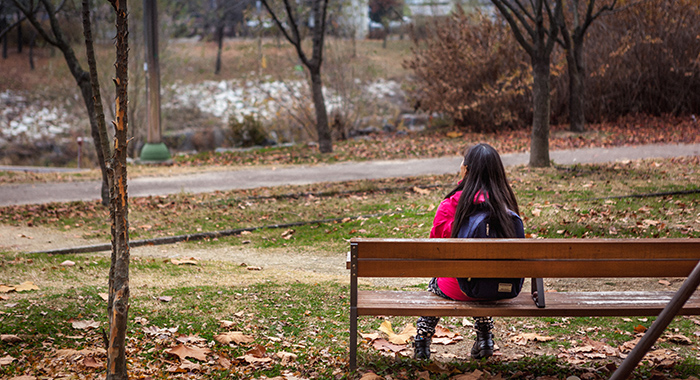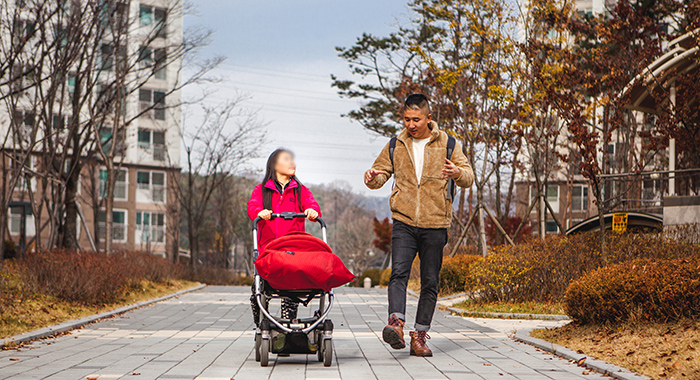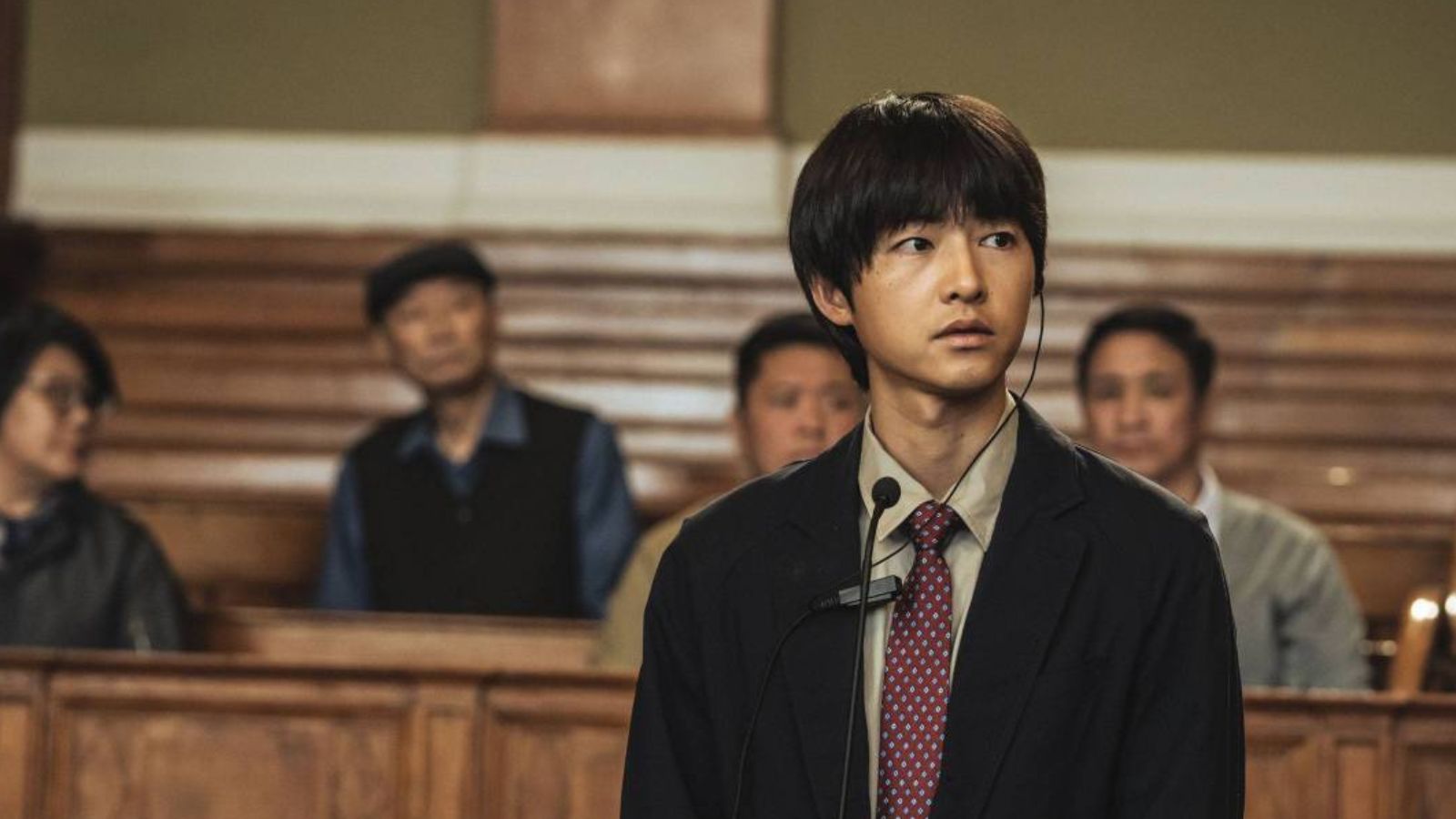Yoon Ha's Story: Part 1 - Life in North Korea

Yoon Ha resettled to South Korea through LiNK’s network about a year ago. She recently shared her story with us. This is part one of three. Continue to part two.
When I was asked, “How was your life in North Korea?” for the first time, I just started crying because my life there was so hard. It was so hard.
When I was a little kid my mom left me, my younger sister, and my dad, because of our financial struggles. I felt so abandoned and unloved.
And even though I was young, I had to start working to contribute to my family’s finances. My sister and I would forage for plants in the mountains and riversides. We carried the herbs, roots, and pinecones on our backs, walking for three hours to get to the marketplace. We sold our stuff so we could get corn powder to eat. And then we would walk the three hours back to our house. It was very, very hard.
In my late teens my father passed away. I was devastated. After a few years of living with relatives, my sister and I moved back to live with our mom again. But we were still very poor. People would make fun of us for being so poor and not having a father around. I felt a lot of shame about my family and living situation.
When I was 22, my mom asked me to start living with a man much older than me to lessen the financial burden on my family. I didn’t like living with him at all.
I decided to leave my hometown to find a better life somewhere else. I walked for a few days to get to Hamhung, one of the biggest cities in North Korea, hoping I could find work there.

In the city, I did a lot of things to make money. I would sell gas lighters and secondhand vinyl. I had to do it secretly because it was illegal. And it never paid well--just enough to buy food. I was staying at homes, cheap inns, empty houses, and even sleeping on the streets and next to graves when I had to. Sometimes I got beaten by people from the city because they didn’t like that I was making money but wasn’t from there.
I worked there for many months, but I couldn’t save any money so I decided to go back to my mom’s place. My mom and my sister were still struggling, and having me back was a burden to them. So I left home again and walked to Pyongyang to find work. In North Korea you need a special permit to move to different cities, and I didn’t have one. I got caught and sent to jail for 10 days.
After I was released, I started walking to other cities again to find work. I knew I might get caught by the police again, but I couldn’t go home. I walked a lot. Walking was the only way I could travel to where I needed to go.
I made it to another town and found work crushing ore to extract gold. The work was illegal and we would do it secretly in people’s houses. In one of these houses, I got beat up and got kicked out. I didn’t do anything wrong; they just didn’t want to pay me. Even after that incident I continued to do the same work in other houses. For the first time in my life, I had made a decent amount of money--enough to buy 100 kg of corn.
I was so happy. I would be able to bring some money to my mom and sister so we could eat food for a while. I also missed my family, so I started heading home.

At a bus station on the way home, a woman and her daughters asked me to get water for them. They stole all of my money and ran away.
I couldn’t handle all the bad things that kept happening to me. It felt like my life was hopeless and pathetic. I went to a river near the bus station to commit suicide. But right when I was about to jump into the river, all of sudden a thought came over me.
“Why do I have to die? Why? I've not done anything wrong. I'm still only in my early 20s.” I made the decision to live and make the better life I wanted.
Instead of going home, I started walking again. I just kept going north. Even though I was so hungry, the hope for a better life drove me to keep walking.
After walking for days, I somehow arrived in Hyesan, a city on the border with China. I saw many people like me, who had been wandering around in search of food and work. I had travelled to many different parts of North Korea, and came to the conclusion that life was difficult everywhere in my country.
A couple in their 30s or 40s approached me and asked how old I was. I told them my age, 23. They asked if I wanted to go to China. They said I could have a better life there.
“A better life? Yeah, I would do anything to have a better life.”
So I decided to go to China with them. I was so focused on having a better life; I didn’t ask many questions. A few days later, in the darkness of night, we crossed the river into China.
Continue reading with part two.
My Name Is Loh Kiwan | Fictional Story, Real Lives
From a crumpled piece of paper, he copies his name onto the Application for Recognition of Refugee status. The letters flow together in neat, sloping script to spell–Loh Kiwan.
This seemingly mundane declaration of identity serves as the focal point of Netflix’s recently released movie, My Name is Loh Kiwan. Showcasing the titular character’s past and present struggles as a North Korean defector seeking asylum in Belgium, the film follows Kiwan’s journey through both hope and heartbreak while he fights for a new life in freedom. He shows unimaginable resilience in the face of tragedy, betrayal, and bureaucratic apathy, carving out a place where he can live as himself, for himself.

Though based on a fictional novel, Loh Kiwan’s story captures the real life experiences of many North Korean refugees. Whether it be the harrowing circumstances of his escape, the subsequent challenges Kiwan faces while applying for asylum, or even the emotional turmoil of contending with his trauma, My Name is Loh Kiwan derives its drama from reality when depicting the struggles of North Korean defectors.
Uprooted by an act of defiance that saves his friend’s life, Kiwan and his mother escape across the border to China and live there under constant threat of arrest and forced repatriation. With no legal status as refugees and no legal options for leaving the country without government approval, North Korean defectors in China are exceptionally vulnerable to trafficking and exploitation. They live in the shadows, concealing their identities as best they can, despite cultural and language barriers. If captured and returned to their home country, they are subject to brutal torture, imprisonment, and execution. Rather than face such inhumanity, many see suicide as a final escape and carry poison or razor blades with them, much like Kiwan and his mother.
It is ultimately his mother’s sacrifice that saves Kiwan from such a fate. Her death forces him into a position nearly every North Korean refugee recognizes–having to leave behind friends, family, and loved ones with aborted goodbyes for the sake of everyone’s safety and survival. Kiwan’s only material connection to his mother is a photo and a wallet full of blood. In reality, most leave with even less than that.
Not wanting to incriminate the people close to them if they are caught trying to escape, most North Korean refugees forgo any identifying documents or proof of their existence. They take only the bare essentials for survival, not knowing that their arrival in a new country is only the beginning of their journey, or even if they'll make it.
But this is not the narrative Liberty in North Korea believes in. No North Korean person should have to endure the struggles or celebrate the successes of resettlement alone. Much like the assistance Kiwan later receives from an advocacy group that offers legal support and a community of other North Koreans, LiNK walks with our North Korean friends on their journey to freedom. And when they begin new lives, we support their success, amplify their voices, cultivate more leaders and changemakers working on this issue together.
In this, Kiwan’s story reflects yet another reality of the North Korean people. Not only do they encounter extraordinary hardships, but also, they face them with extraordinary strength. Throughout the film, Kiwan persists in his pursuit of an earnest, honest life. Despite setbacks and situations where he’s forced into hurt or hiding, he stays true to his mother’s wish for him to live well, and in doing so, inspires the people around him to do the same.

He finds hope, love, and freedom in others, but most importantly, in himself. When placed on trial to prove his identity before the court, Loh Kiwan proclaims the name his mother gave him.
Owning one’s identity as a North Korean person is not always easy. From the start of their escape, they are forced to hide. Once they reach freedom, the stigma and prejudice people hold towards their homeland pressures many to erase their accent or change their name–sometimes as a form of self-protection, other times as a way to fit in.
What Kiwan’s story shows, however, is that there is hope at the end of hiding. There is beauty in the simple, everyday life he longs for–a life where he can work for himself and share meals with friends, have a home, have a future, and have the choice to stay or go.

This is the life the North Korean people deserve, and every day, both within the country and without, they fight towards a better future. Their courage and indomitable spirit are not just figments of fiction. With your help, their freedom will become a reality.
Sign up below to learn how YOU can help support North Korean refugees today.




